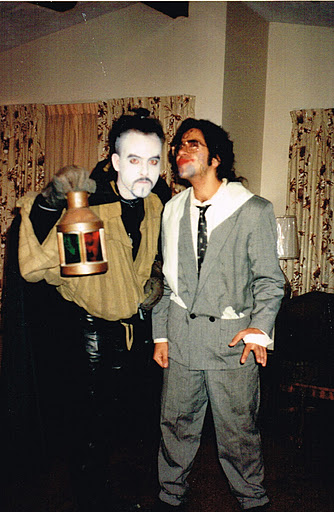The author describes the second older brother whose death hit harder than that of the first.
Mood music:
[soundcloud url=”http://api.soundcloud.com/tracks/48842027″ iframe=”true” /]
It doesn’t seem right that a friend’s death would hit me harder and fuel my insanity more than the death of a biological brother. But that’s what happened.
This is the story of Sean Marley, who introduced me to metal music, taught me to love life, and whose death was one of the cattle prods for my writing this blog.
I had known Sean for as long as I could remember. He lived two doors down from me on the Lynnway in Revere, Mass. He was always hanging around with my older brother, which is one of the reasons we didn’t hit it off at first.
Friends of older siblings often pick on the younger siblings. I’ve done it.
Sean was quiet and scholarly. By the early 1980s he was starting to grow his hair long and wore those skinny black leather ties when he had to suit up.
On Jan. 7, 1984 — the day my older brother died — my relationship with Sean began to change. Quickly. I’d like to believe we were both leaning on each other to get through the grief. But the truth of it is that it was just me leaning on him.
He tolerated it. He started introducing me to Motley Crue, Ozzy Osbourne, Van Halen and other hard-boiled music. I think he enjoyed having someone younger around to influence.
As the 1980s progressed, a deep, genuine friendship blossomed. He had indeed become another older brother. I grew my hair long. I started listening to all the heavy metal I could get my hands on. Good thing, too. That music was an outlet for all my teenage rage, keeping me from acting on that rage in ways that almost certainly would have landed me in jail.
We did everything together: Drank, got high, went on road trips, including one to California in 1991 where we flew into San Francisco, rented a car and drove around the entire state for 10 days, sleeping and eating in the car.
This was before I became self aware that I had a problem with obsessive-compulsive behavior, fear and anxiety. But the fear was evident on that trip. I was afraid to go to clubs at night for fear we might get mugged. When we drove over the Bay Bridge I was terrified that an earthquake MIGHT strike and the bridge would collapse from beneath us.
I occupied the entire basement apartment of my father’s house, and we had a lot of wild parties there. Sean was a constant presence. His friends became my friends. His cousin became my cousin. I still feel that way about these people today. They are back in my life through Facebook, and I’m grateful for it.
He was a deadly serious student at Salem State College, and his dedication to his studies inspired me to choose Salem State as well. Good thing, too. That’s where I met my wife.
In 1994, things started to go wrong for Sean. He became paranoid and depressed. He tried to hurt himself more than once. I didn’t know how to react to it.
That fall, he got married and I was best man. I wanted to be the greatest best man ever. But I was so self-absorbed at the time that there was no way I could effectively be there for someone else, even him.
Over the next two years, his depression came and went. He was hospitalized with it a couple times. By the summer of 1996, he was darker and more paranoid than I’d ever seen him. But I was so busy binge eating and worrying about my career that I didn’t pay enough attention.
In November 1996, I got a call at work from my mother. She had driven by Sean’s house and saw police cars and ambulances and all kinds of commotion on the front lawn. I called his sister and she put his wife on the phone. She informed me he was dead. By his own hand.
I spent a lot of the next 10 years angry at him for doing such a thing. He had everything going for him. And he chose to end it. I didn’t understand it, even as I was descending into my own brand of craziness.
The reason his death hit harder than my own brother’s is complicated. I think it’s because I had been burned for the second time, which is always worse than the first. It’s probably that I was an adult the second time and had a greater awareness of circumstances behind his death. Or it’s probably just the nature of the ending.
It took my own struggle with depression and OCD years later to truly grasp what he had gone through. I wasn’t there for him, but by sharing my own struggles I can hopefully be there for others.
Life has been good in the years since his death. I married a wonderful woman, followed a career path that’s produced many Blessings, found God and had two precious children.
We named our first son Sean Michael Brenner. And with that, I guess I was able to move on.
My son is every bit as smart as the man he was named for. His wit tickles me every day. And he’s caring beyond his years.
You can bet your ass I’ll be watching him like a hawk to make sure he doesn’t become too much like the man he’s named after.
Continued in “Death of a Second Sibling“




